Share
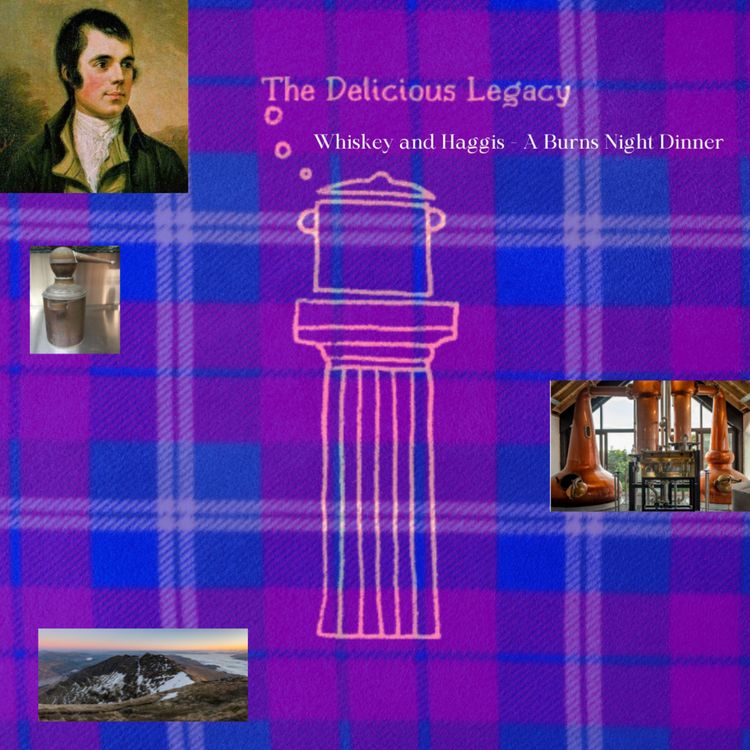
The Delicious Legacy
Whiskey and Haggis- A Burns Night Dinner
Season 4, Ep. 16
•
25th of January is the birthday of Scotland's National Poet: Robert Burns.
What was served on the first ever commemorative dinner in honour of Burns?
What are the origins of the delicious pudding Haggis, and how is related to an ancient Greek comedy by Aristophanes?
How are the Arabs responsible for Whiskey?
And what is on offer on a traditional Burns night? What delicious fare is available for all party goers?
Join me to find out more about this absolute classic Scottish party!
Enjoy!
The Delicious Legacy
Support the podcast on Ko-Fi and Patreon for ad-free episodes!
More episodes
View all episodes
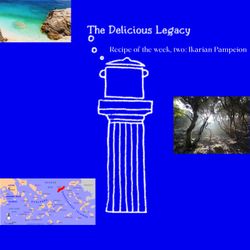
Stocking fillers: Recipe of the week, two: Ikarian Pampeion
06:51|Hello!Every Saturday in The Delicious Legacy podcast your freshest "stocking filler" recipe of the week is out!This time I’m travelling to the delightful island of Ikaria in the Western Aegean sea!With a simple one pot veg recipe!If you want to know more about Ikaria, read my Patreon post here:https://www.patreon.com/posts/ikaria-island-of-115744979Music by Milts BoumisLove,The Delicious Legacy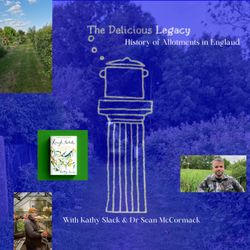
20. A History of Allotments in England
47:08||Season 7, Ep. 20Hello!New episode is out now for you my delightful Patreon backers! Out early and ad-free!Why England and by extension all of UK is so allotment "obsessed" ? What does it all mean?Firstly, what is an allotment? When did it all started?As someone who moved in UK many years ago, seeing this lovely spaces in cities filled me with a sense of serenity, and an air of quaint old school happiness lets say, they evoked something romantic and from long lost era. Of course over the years I learned a lot about why these exist; what purpose and role fulfil in the society and the soul of the nation.Who has one, who are they owned and maintained by, and crucially why people still insist having? What is the source of their popularity?Importantly, can one person/family feed themselves with produce from an allotment? Is there any point on doing so?Anyway I hope you'll enjoy my little potted allotment history here alongside with the interview with author and gardener Kathy Slack and nature conservationist, environmentalist and wildlife presenter Dr Sean McCormack!Kathy's Substack and Insta:https://kathyslack.substack.com/https://www.instagram.com/gluts_gluttony/Sean's media:https://drseanmccormack.com/https://www.instagram.com/thatvetsean/Get his lovely children's book about rewildinghttps://www.thegreatbritishbookshop.co.uk/products/beaver-believerspos=1&sid=f9e160ecd&_ss=rLinks about allotments and London's city farms and gardens:Calthorpe Community Garden:https://www.calthorpecommunitygarden.org.uk/about-usSitopia Farmhttps://sitopiafarm.com/pages/about-our-farmCommunity veg boxes:https://growingcommunities.org/Love,The Delicious Legacy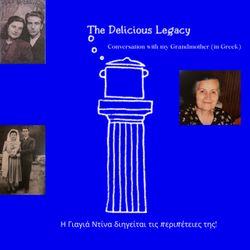
19. Conversation in Greek with my Grandmother - Η Γιαγιά Ντίνα διηγείται τις περιπέτειες της!
45:28||Season 7, Ep. 19Hello!This is another episode in Greek, my little parallel series of getting some episodes out for Greek audienceThis time I thought I'll release a part of my conversation with my grandmother- my yiayia- my father's mother.From the mountainous north west Greece, her childhood up in the villages, where bandits and others where making life hard in the 1920's. Only a few years earlier this part of Greece was part of the Ottoman Empire.A fascinating story of a troubled period for Greece, her story takes us from the 1920's to the end of WW2.I recorded this about 17 years ago! It was 2009. EnjoyThom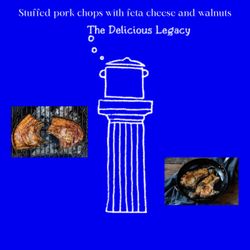
Stocking fillers: Recipe of the week - Stuffed pork chops with feta cheese and walnuts
05:02|Hello!Your recipe of the week is here!Every Saturday in The Delicious Legacy podcastEnjoy!Thom
18. Traditional Christmas around the Greek Table
26:40||Season 7, Ep. 18Hello! Christmas is approaching! Time for some recipes to inspire you in your Christmas cooking! (If you do cook of course! Otherwise, psssss, pass it on to your spouse!) It's also the time the ‘Kalikanzaroi’ (goblins that live underground all year according to Greek folklore) are coming up to Earth to annoy humans. How do you distract them? What foods do they like? So I've got a little treat for you, my curious and greedy gastronomers! On this episode of The Delicious Legacy podcast, we are going to Greece, so aside from melomakarona, stuffed chicken with rice and chestnuts, or roast piglet, what else do we Greeks ate at Christmas past? What was on the festive table in Epirus, Crete, Mani, Thrace, or even Kastelorizo? Let's re-discover some of the older, regional, and nearly extinct dishes for all corners of the Hellenic world! What is "Patoudo"? What about the dish called 'baby Jesus's "swaddling clothes"? And "babo"? What is the dish called "Gold" from the remotest Greek island to the East? These and much more on today's episode!Listen now -on all platforms that you get your podcasts from- and share with friends, family, colleagues, and rate and review! Enjoy! x The Delicious Legacy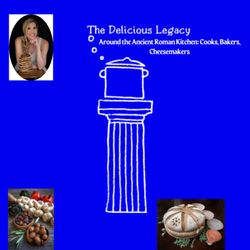
17. RE-AIR: Ancient Rome's Bakers, Cooks and Kitchens w/ Extra Content!
53:24||Season 7, Ep. 17Hello!On this classic episode from the archives of The Delicious Legacy I decided to include some ten minute of extra content from my interview with Farrell and I have remastered the audio as it was a bit dodgy the last time round. Hope it's more pleasant and easier to listen now!I'm very excited about this episode! Farrell Monaco is a culinary & experimental archaeologist, and bread-baking addict! Especially of the ancient Greco-Roman variety...So what better person to chat about the ancient cuisine? And it's a very thought-provoking and thoughtful. Who were the people (and the animals!) who did the hard work?Currently in California -where she was when we spoke online- but mostly researching in Pompeii, Herculaneum and Ostia about ancient Greco-Roman breadways.More info on bread from Pompeii by Farrell Monaco:https://www.bbc.com/travel/article/20230629-adoreum-the-newly-discovered-flatbread-fresco-of-pompeiihttps://www.bbc.com/travel/article/20230406-arculata-the-bread-that-survived-pompeiiApuleius and The Golden Ass:https://en.wikipedia.org/wiki/The_Golden_AssEtruscan Tarquinian Tombs:https://tarquiniaturismo.com/tomb-of-the-triclinium/?lang=en Farrell's website and blog:https://tavolamediterranea.com/Music by Pavlos KapralosEnjoy!Thom & The Delicious Legacy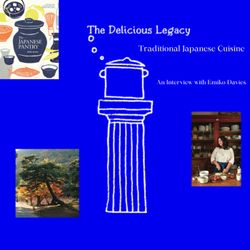
16. Traditional Japanese Cuisine
55:27||Season 7, Ep. 16Hello! New episode is out and I couldn’t be more excited about it!I've interviewed cookbook author Emiko Davies about her latest book "The Japanese Pantry" which came out in October this year.Emiko shares stories of her travels off the beaten track to meet the makers and pay homage to ancient traditions that have been around for centuries. Ingredients, dishes and recipes that are lost in the mists of time, and rare foods that might be lost forever!How do you make sake and rice vinegar? What are the sake lees and how do we use it? What is the rare delicacy of Yubeshi?We will explore the key ingredients of Japanese cuisine and on top of this, we will take a deep dive some unknown ingredients and dishes from all over the Japanese archipelago.You can follow the pensioner, mountain tea farmers who farmed at 1000 feet above sea level deep inside a forest, on Instagram at @nakaichamuraiEnjoy!Thom & The Delicious Legacy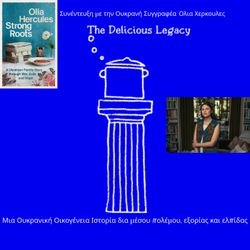
15. More Conversations In Greek - Συνέντευξη με την Ουκρανή Συγγραφέα 'Ολια Χερκουλες
55:30||Season 7, Ep. 15Hello!This episode is in Greek and it's the translation of the episode I recorded a couple of months ago with the food writer Olia Hercules about Ukrainian Food and Culture! The original episode can be found here: https://shows.acast.com/the-delicious-legacy/episodes/ukrainian-food-culture-with-olia-herculesΓεια σας! Το σημερινό επεισόδιο είναι μια συνέντευξη με την Ουκρανη συγγραφέα και σεφ Ολια Χερκουλες, που θα μας πει για την παραδοσιακή κουζίνα της Ουκρανίας, και τα φαγητά αλλά και τιε επιρροές από τους γείτονες λαούς μέσα στον χρόνο.Μιλήσαμε επί της ευκαιρίας του καινούργιου της βιβλίου, με τίτλο Strong Roots: "Μια Ουκρανική Οικογένεια Ιστορία δια μέσου πολέμου, εξορίας και ελπίδας"Μπορείτε να βρείτε αυτό αλλά και όλα τα βιβλία της εδώ: https://oliahercules.com/booksΕυχαριστώ για την ακρόαση. Μέχρι την επόμενη φορά, ας είμαστε δυνατοί γεροί και γεμάτη κουράγιο και ελπίδα.Η μουσική είναι του Παύλου ΚαπράλουΜε εκτίμηση,The Delicious LegacyThom Ntinas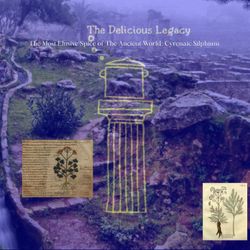
14. The Most Elusive Spice of The Ancient World: Cyrenaic Silphium
44:12||Season 7, Ep. 14Hello!A newly updated episode about Silphium! Or Asafoeitida? I was inspired by History Hit's newly released documentary with Dan Snow called Ancient Adventures: Libya where the team went to explore extraordinary Greek and Roman sites, centred around one of the greatest cities of the ancient world, Cyrene.So I thought it is time to talk again with more updates about silphium and with recipes and tasting by me here!What do we know of the ancient silphium? What do the authors say it tastes? And when was the last time that it was mentioned in texts?Plus the relationship with it's eastern cousin asafoetida and its use in Indian cuisine!Enjoy!With the voice over by Mark Knightand music by Pavlos KapralosLove,Thom & The Delicious Legacy